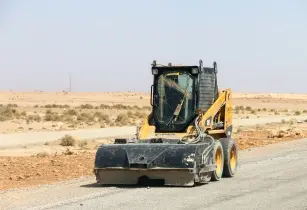To improve food security, as well as to support trade and market development in South Sudan, United Nations Office for Project Services (UNOPS) has constructed feeder roads – secondary roads designed to funnel traffic to major roads – using US$51mn funding from the European Union (EU)
A road is more than just a way for getting from one place to another but for some communities in South Sudan, it's a lifeline to markets, food and basic services.
Years of violent conflict, population displacement and trade disruption have resulted in extreme levels of food insecurity in South Sudan. Nearly seven million people – 60% of the population – struggle to get enough food to meet their daily needs.
The majority of people in South Sudan depend on subsistence farming – only growing enough crops and raising enough livestock to meet their needs – for their survival.
Progressing beyond subsistence farming is difficult – for much of the year, farmers aren’t able to access markets or even move far outside their communities.
“The EU is committed to help in making sure feeder roads connect to main roads. This will improve security and allow goods and services to reach all parts of the country,” said, Christian Bader, ambassador of the European Union to South Sudan.
As part of the project, more than 170 kilometres of feeder roads in Warrap State, Lakes State, Northern Bahr el Ghazal State and Western Bahr el Ghazal State were constructed and four markets were built.
Now the roads can be used all year round – and farmers can get their goods to markets regardless of the weather.
Wide ranging benefits
For Abuk Deng Alue, a farmer from Mayom Angok, the feeder roads make it easier for her to sell her surplus produce – and earn money to buy other goods.
The market in Ayien Amoul is also receiving more visitors, who are looking to buy groundnuts, fish and other local agricultural products. But it's not just local markets that are thriving – local businesses are also seeing the benefits of the feeder roads.
"The road has also improved security in the area as many people can travel late hours on the road, which was not possible before," stated Simon Garang Dengand, paramount chief of Marial Bai County.
To ensure the benefits of the feeder roads are felt far into the future, UNOPS is also training South Sudanese state engineers so that they will be prepared to take over the maintenance of the feeder roads.





